After reasonable success with last year’s Nothing Phone, the fledgling brand is back once more with the Nothing Phone 2. This time around, Nothing is spreading its reach advance, formally bringing its phones to the US for the first time. Just appreciate the Pixel 7a, the Nothing Phone 2 promises a high-end experience while keeping the costs significantly lower than the competition. But which phone is the better pick? We take a closer look in this Nothing Phone 2 vs Google Pixel 7a comparison.
Nothing Phone 2 vs Google Pixel 7a: At a glance
Curious how the Nothing Phone 2 and the Pixel 7a contrast? Here’s a quick summary of the key differences:
- Google Pixel 7a is cheaper than Nothing Phone 2 by about $100.
- Google Pixel 7a has a more robust camera and photography features.
- Nothing Phone 2 has a larger display with a higher refresh rate than the Pixel 7a.
- Nothing Phone 2 has higher RAM and storage options than the Pixel 7a.
- Google Pixel 7a has better water resistance than the Nothing Phone 2.
Nothing Phone 2 vs Google Pixel 7a: Specs
| Nothing Phone 2 | Google Pixel 7a | |
|---|---|---|
|
Display |
Nothing Phone 2
6.7-inch LTPO OLED |
Google Pixel 7a
6.1-inch OLED |
|
Processor |
Nothing Phone 2
Qualcomm Snapdragon 8 Plus Gen 1 |
Google Pixel 7a
Tensor G2 |
|
GPU |
Nothing Phone 2
Adreno 730 |
Google Pixel 7a
Mali-G710 GPU |
|
RAM |
Nothing Phone 2
8 or 12GB LPDDR5 |
Google Pixel 7a
8GB LPDDR5 |
|
Storage |
Nothing Phone 2
128, 256, or 512GB |
Google Pixel 7a
128GB UFS 3.1 |
|
Power |
Nothing Phone 2
4,700mAh battery |
Google Pixel 7a
4,385mAh battery |
|
Cameras |
Nothing Phone 2
Rear:
– 50MP wide (Sony IMX890, ƒ/1.88, 1/1.56-inch sensor, 1µm pixel size, 24mm focal length, OIS, EIS, HDR) – 50MP ultrawide (Samsung JN1, ƒ/2.2, 1/2.76-inch sensor, 114-degree FoV, EIS, HDR) Front: |
Google Pixel 7a
Rear:
– 64MP wide primary sensor (0.8μm, ƒ/1.89, 80-degree FoV, 1/1.73″ image sensor size, Super Res Zoom up to 8x) – 13MP ultrawide (1.12μm, ƒ/2.2, 120-degree FoV) Front: |
|
Video |
Nothing Phone 2
Rear wide:
– 4K at 60 or 30fps – 1080p at 60 or 30fps Front: |
Google Pixel 7a
Rear:
– Primary: 4K at 60/30fps, 1080p at 60/30fps – Ultrawide: 4K at 30fps, 1080p at 60/30fps Front: |
|
Audio |
Nothing Phone 2
Triple mics
Dual stereo speakers |
Google Pixel 7a
Stereo speakers |
|
Durability |
Nothing Phone 2
IP54 |
Google Pixel 7a
IP67 |
|
Biometrics |
Nothing Phone 2
Optical in-display fingerprint sensor |
Google Pixel 7a
In-display fingerprint scanner |
|
SIM |
Nothing Phone 2
Dual physical SIM |
Google Pixel 7a
Dual-SIM (1x nano-SIM + 1x eSIM) |
|
Connectivity |
Nothing Phone 2
4G: Gigabit with 4×4 MIMO |
Google Pixel 7a
All countries:
– 5G sub6 – Bluetooth 5.3 – NFC US, CA, UK, EU, AU, and JP only: TW, SG, and IN only: |
|
Bands |
Nothing Phone 2
5G NR: n1, n2, n3, n5, n7, n8, n12, n20, n25, n28, n30, n38, n40, n41, n66, n71, n75, n77, n78 |
Google Pixel 7a
Model GWKK3:
– GSM/EDGE: Quad-band (850, 900, 1800, 1900 MHz) – UMTS/HSPA+/HSDPA: Bands 1,2,4,5,6,8,19 – LTE: Bands B1/2/3/4/5/7/8/12/13/14/17/20/25/26/28/29/30/38/40/41/48/66/71 – 5G Sub6: Bands n1/2/3/5/7/8/12/14/20/25/28/30/38/41/48/66/71/77/78 Model GHL1X: Model G0DZQ: Model G82U8: |
|
Ports |
Nothing Phone 2
USB-C |
Google Pixel 7a
USB-C 3.2 Gen 2 |
|
Software |
Nothing Phone 2
Nothing OS 2.0 based on Android 13 |
Google Pixel 7a
Pixel UI |
|
The Glyph |
Nothing Phone 2
33 individual addressable LED zones |
Google Pixel 7a
N/A |
|
Dimensions and weight |
Nothing Phone 2
162.1 x 76.4 x 8.6mm |
Google Pixel 7a
152 x 72.9 x 9mm |
|
Colors |
Nothing Phone 2
Dark Gray or White |
Google Pixel 7a
Charcoal, Sea, Snow |
|
In-box contents |
Nothing Phone 2
Nothing Phone 2 |
Google Pixel 7a
USB-C to USB-C cable (USB 2.0, 1m) |
The Nothing Phone 2 and Google Pixel 7a have a similar philosophy, aiming to build a flagship-appreciate device while cutting certain corners in order to keep pricing down. What’s different is the actual approach taken. The Pixel 7a favors AI trickery and ease of use over blazing speeds. In contrast, the Nothing Phone 2 prioritizes raw spec performance with its faster CPU, more RAM options, and its beefier display.
The Nothing Phone 2 not only has a bigger display at 6.7 inches, but it’s also a better one. You’ll get Full HD+ panel on both handsets (2,412 x 1,080 versus 2,400 x 1,080), but the Phone 2 is an LTPO display. This means it can vary its refresh rate from 1Hz to 120Hz. In comparison, Pixel 7a’s 6.1-inch OLED has a fixed refresh rate of 90Hz. The Phone 2 also has much better peak brightness at 1,600 nits — about 600 nits brighter than the Pixel 7a is capable of delivering.
Both phones aim for cheaper-than-flagship prices while providing a premium experience — but how they go about it is quite a bit different.
Durability is also another area where the phones contrast. The Phone 2 has newer (yet still kind of old) Gorilla Glass 5 to protect its display and rear. The Pixel 7a features a plastic back which will likely demonstrate to be more durable, but the front display is protected by Gorilla Glass 3. Although that’s still better than nothing, it feels appreciate a bit of a misstep on Google’s part.
On the flip side, the Pixel 7a has a slight edge thanks to its IP67 rating. This rating means the phone not only can keep dust out completely, but it’s also protected against water up to one meter for 30 minutes. The Nothing Phone 2 has an IP54 rating which means it has modest dust protection but can only handle splashes of water. This isn’t a common rating for phones, as even many of today’s mid-rangers have at least an IP67.
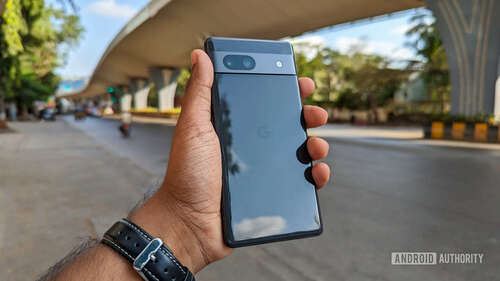
Aamir Siddiqui / Android Authority
Diving deeper into the internals, the Pixel 7a has the same Tensor G2 SoC that powers its Pixel 7 and Pixel 7 Pro flagships. The Tensor empowers Google’s many AI and photography optimizations.
The Nothing Phone 2’s Qualcomm Snapdragon 8 Plus Gen 1 is faster in terms of raw GPU and CPU power, but the Tensor G2 is plenty capable of running all the best Android apps and games without skipping a beat. Just be aware that the Tensor G2 tends to run hot, especially during prolonged gaming sessions.
During our review process, we found the Nothing Phone 2 was plenty fast and fluid in almost any situation. However, one potential concern is GPU throttling.
During our 3DMark Wild Life stress assess, we found a 36% drop in GPU scores after five runs. This is much more aggressive than many other phones with this chip, appreciate the OnePlus 10T. Whether this is actually a real problem in day-to-day is yet to be seen. It’s also possible later firmware updates will boost the situation.
While the Pixel 7a only offers 8GB of RAM and 128GB of storage, the Nothing Phone 2 is a bit more flexible with its options. You’ll find models with either 8 or 12GB of LPDDR5 RAM and storage configurations of 128, 256, or 512GB.
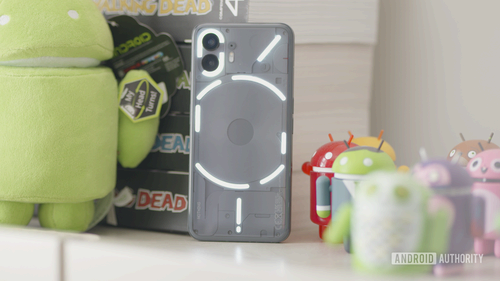
Damien Wilde / Android Authority
Those who want a true dual-SIM phone will be happy to know the Nothing Phone 2 features a dual-SIM tray. While the Pixel 7a can work with two SIMs, it only has one physical slot. This means your second line will have to use the eSIM card.
The Pixel 7a might not have true dual-SIM, but it does have the advantage of optional mmWave uphold (through a special variant). The Nothing Phone 2 will not uphold mmWave at all, though it will still play nicely with Verizon’s Sub-6Ghz network.
That’s it for the main hardware differences aside from camera, battery, and charging tech – which we’ll talk about shortly. Before we get there, let’s converse software.
How does the software contrast?
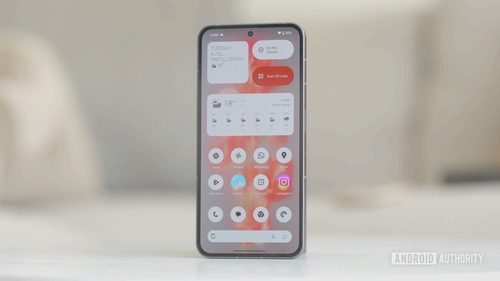
Damien Wilde / Android Authority
Google’s Pixel series is known for its minimalist approach to user interfaces. It gives users a clean and near-stock experience while still adding meaningful extras, including customizable themes with Material You and AI features appreciate Call Screening and Google Duplex for making reservations and appointments. You can learn more about some of the better tips and tricks to make the most out of the Pixel 7a in our guide.
As you’d visualize, Google also has a solid reputation for updates on its Pixel phones. You’ll get three years of Android updates and five years of security updates. Nothing is a much newer company with a less established reputation, but the good news is they seem to be fairly on top of updates as well, with the promise of three years of OS upgrades and four years of Android security updates.
As for Nothing’s software? When Nothing OS debuted last year, it had a very spartan UI, with no bloatware and hardly any custom apps. If we are honest, it almost felt too empty. Luckily, Nothing OS 2.0 (based on Android 13) course corrects and no longer feels appreciate beta software.
There are plenty of useful Nothing apps this time around, including a great custom weather app and a new one-handed mode feature. There are also widgets on the lock screen, custom widget groups, and plenty of other small touches that help you make the OS your own.
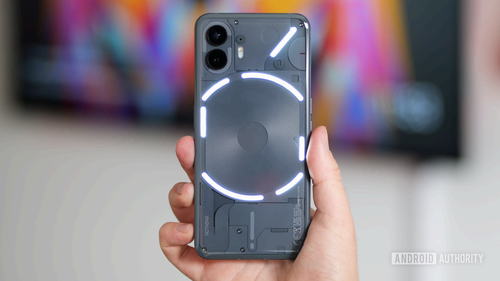
Damien Wilde / Android Authority
A lot of the coolest software customizations are built around the Glyph. This is a unique set of 11 LED strips and 33 LED zones found on the back of the phone that works similarly to the old-school LED lights found on older Android devices. Unlike the LED lights of the past, Glyph goes a lot advance than providing simple notifications.
Here’s a brief rundown of the Glyph’s biggest new features:
- Glyph Composer: This lets you create customized glyph patterns complete with sound. These specialized glyphs can then be applied to your contacts, giving you a fun and customized way to recognize the person calling or texting you.
- Essential Glyph: This is all about notifications. This lets you set specific notifications for apps you deem “essential.” When an alert comes through, the diagonal light in the top right corner of the phone turns solid white and stays that way.
- Timer: You can also set timers via a tile in Quick Settings. You specify a time and set your phone face down on a flat surface. The Glyph will pulse when it starts, and then the LED strip will slowly fade out. When the timer is up, the LEDs will flash, and the sound can optionally blare.
- Progress: Progress is similar in concept to the timer feature, but instead, it integrates with partner apps. Right now, it only works with one app, Uber. If you order a ride, the Glyph will countdown and alert you when your driver is almost there.
That’s a quick look at Glyph, but you can learn more about Nothing Phone 2’s unique lighting features in our Glyph guide.
Nothing Phone 2 vs Google Pixel 7a: Size comparison
The Phone 2 measures 162.1 x 76.4 and has a thickness of 8.6mm. Meanwhile, the Pixel 7a is a bit smaller at 152 x 72.9, though it’s actually a tad thicker at 9mm. Both phones have reasonably thin bezels, as well as a centered camera cut-out. The Nothing Phone 2 does have slightly more rounded corners that remind me a bit of the Galaxy A54 5G.
The real differences can be found on the back. Nothing and Google both have very unmistakable design languages.
The Pixel 7a largely borrows the Pixel 7’s design, including the same protruding camera visor made of metal. That said, the glass back is swapped for plastic here in order to save some costs. Thankfully, the phone still looks fairly premium, with the anodized metal frame helping add to this feel.
The Nothing Phone 2 takes a similar approach to its predecessor. The body shape, antenna layout, and flat sides are reminiscent of the iPhone family, but the transparent look helps make it clear this is no iPhone. Although Nothing covers up most of the internals with panels, you can see cooling pipes, the glyph lighting system, and a few other bits. Not everyone is going to love the naked look, but it’s an easy way to set the Nothing Phone series apart from the rest of the crowd.
Both phones feel great and are comparable in size to other phones with similar displays, but the Phone 2 is arguably much easier to hold than you’d expect from a phone of its size, thanks to the chamfer between the metal frame and the back glass.
Of course, the chamfer is only useful if you don’t add a case. For many users, that’s probably not a good idea considering the phone’s lack of a proper IP rating and use of older Gorilla Glass 5 over something more durable.
The Phone 2 is slightly heavier than the Pixel 7a at 201g versus 194g. You won’t really notice a difference between them, but it is worth pointing out they are a bit heavier than some of the other flagships on the market. In comparison, the Samsung Galaxy S23 weighs just 168g. Nonetheless, they are far from heavy either.
Lastly, let’s talk about color choices. The Phone 2 comes in White and Dark Gray, while the Pixel 7a has the option of Charcoal, Sea, or Snow.
Nothing Phone 2 vs Google Pixel 7a: Camera
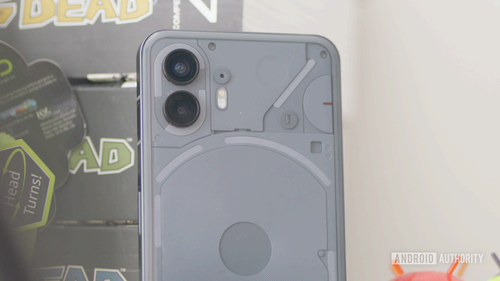
Damien Wilde / Android Authority
Google is known for its camera chops, and the Pixel 7a doesn’t disappoint. You get a 64MP Sony IMX787 main shooter backed by an ultrawide 13MP sensor. Based on paper alone, this might not seem that impressive. After all, the Nothing Phone 2 features an IMX890, which bests the 787 in a few ways. You not only get a larger 1/1.56-inch sensor compared to the smaller 1/1.73″ sensor on the Pixel 7a, but the Phone 2’s main shooter also has bigger pixels at 0.8μm pixels versus 1μm.
Don’t let this fool you. The true star here has little to do with the camera package. We’re talking about the Tensor G2 SoC. This chip has tons of image-processing smarts baked right in, including Magic Eraser, Face Unblur, Long Exposure, and more.
The Tensor G2 also allows for extremely advanced image processing that lets Google do much more with its camera than pure specs would propose. Google is known for building simple cameras that use AI trickery so that even someone as horrible with photography as myself can still take a decent shot.
Pixel 7a primary camera samples
So how are the actual images produced? The Pixel 7a has excellent color accuracy, works great in low light, and has some of the best portrait detection out there. While many phones struggle outside of human subjects, the Pixel 7a doesn’t have an issue here.
Of course, nothing is perfect. The saturation can be a bit heavy at times, and we’d appreciate to see better zoom-in capabilities. You can safely hit around 4x zoom, but after that, the image quality drops significantly. Still, when you consider the price range, the Pixel 7a is hard to beat.
The Nothing Phone 2 is powered by a 50MP Sony IMX890. You’ll get an f/1.88 aperture, 1/1.56-inch sensor size, shooting 1µm pixels, and OIS and EIS uphold. Backing it is a Samsung JN1 sensor with f/2.2 aperture, a 1/2.76-inch sensor size, and a 114-degree field of view.
Nothing Phone 2 primary camera samples
The whole experience is a bit of a mixed bag. Dynamic range is actually very good, especially compared to the Nothing Phone 1. Nothing has also made improvements to noise in shadows as long as your lighting is good, though white balance tends to still be off in overcast settings. Colors are contrast-heavy and can bleed into other objects. We also find the shutter lag a bit annoying. It takes about a half-second longer than the Pixel 7 and Pixel 7 Pro. That might not sound appreciate a big deal, but it could be the difference between missing or taking that perfect shot.
Overall, it’s not a bad camera experience. Still, Nothing has a long way to go if it wants to vie with Google, Samsung, and the other leaders in the camera space. They also need to ditch the Samsung JN1 sensor with the Phone 3. A holdover from its predecessor, it tends to produce muddy textures and halo effects around options. On the bright side, it actually has a pretty solid macro mode onboard.
Nothing Phone 2 ultrawide camera sample
As for selfie cameras? The Pixel 7a has a more modest 13MP wide shooter with 1.12μm, a 1/3.06″ sensor size, ƒ/2.2, and 95-degree FoV. Meanwhile, Nothing again hits harder on paper. It has a 32MP Sony IMX615 with f/2.45, 1.oμm pixels, and a bigger sensor size at 1/2.76-inch.
The Pixel 7a takes decent enough selfies, though they aren’t necessarily as impressive of a showing as what you get from the main camera. As for Nothing, we were actually very happy with selfie snaps. The natural bokeh was decent, especially in portrait mode. The colors and detail were spot on. In many ways, it’s actually a bit better here than the Pixel 7a.
Of course, we have to refer the lack of 4K video on the selfie camera. This is a phone that has a ton of appeal for bloggers, making the lack of 4K pretty perplexing.
Nothing Phone 2 vs Google Pixel 7a: Battery and charging
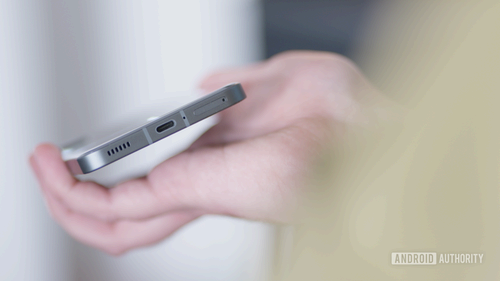
Damien Wilde / Android Authority
The Pixel 7a’s battery life is a known weakness. The 4,385mAh battery is enough to make it through a full day’s use for those with average needs, but not by a wide margin. In our own tests, we’d typically get down to around 20% charge before the end of the day. Of course, more intense use dropped the battery life even faster, with it barely struggling to stay powered on by the end of the night with around 1-4% battery life left.
The Nothing Phone 2 comes in swinging hard with its much larger 4,700mAh battery and more power-efficient components. In our testing, we found the phone could easily last a day and a half before dropping below 10%. That’s with average usage habits appreciate music and video streaming, photography, social media, and light testing. If you are casual with your use, it’s very possible the phone could make it up to two days on a single charge.
The Pixel 7a struggles with poor battery life and slow charging. The Nothing Phone 2 is the polar opposite.
The Nothing Phone 2 also one-ups the 7a in charging speeds with its 45W USB PD PPS standard. It took us around an hour to charge the Phone 2 from empty. That’s a stark difference from the 18W charging on the Pixel 7a. Even with the Pixel 7a’s smaller battery, you’ll still find it takes around two hours to charge up the device from empty.
The Pixel 7a was one of the first phones in its price range to uphold wireless charging, albeit at a glacial 7.5W that took up to four hours to charge up. The Nothing Phone 2 goes advance here as well. You’ll get 15W wireless charging, double the speed of the Pixel 7a. You’ll also get 5W reverse charging, perfect for topping off the battery on your compatible watch or earbuds. We don’t have any testing figures for the wireless speeds yet, but even with the larger battery, the Nothing Phone 2 will have the upper hand.
Keep in mind neither phone includes a charger in the box. You’ll need to buy a third-party wall charger if you don’t have a spare sitting around already. Also, be aware you’ll need a PD PPS brick to get the best charging speeds on the Nothing 2.
Nothing Phone 2 vs Google Pixel 7a: Price
- Google Pixel 7a (8GB + 128GB): $499
- Nothing Phone 2 (8GB + 128GB): $599
- Nothing Phone 2 (12GB + 256GB): $699
- Nothing Phone 2 (12GB + 512GB): $799
The Google Pixel 7a is the cheaper of the two devices, at just $499. It only comes in one flavor, though there are technically other variants appreciate the Verizon model with mmWave uphold, which adds a $50 premium. Meanwhile, the Nothing Phone 2 has a lot more configurations to select from, with the base model starting at $599 and the highest-end variant maxing out at $799.
You can buy the Pixel 7a right now, though the Nothing Phone 2 is currently only available for pre-order. General availability begins on July 17.
Nothing Phone 2 vs Google Pixel 7a: Which should you buy?
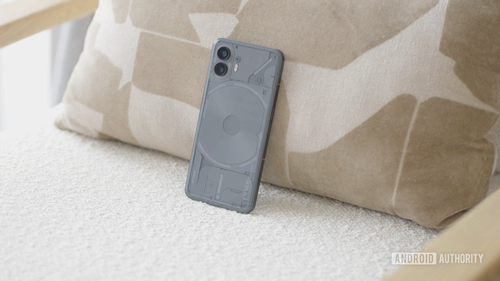
Damien Wilde / Android Authority
To be honest, this was a hard comparison. The Google Pixel 7a is a champion when it comes to camera performance and everyday use and is $100 cheaper than the Nothing Phone 2, but it’s not without its faults. Battery life and charging remain a major sore point, as does its tendency to overheat.
The Nothing Phone 2 has a better CPU, a better display, better charging, and better battery life. Of course, it, too, makes some strange compromises, including an IP54 rating over something more substantial. Additionally, despite its on-paper specs, it doesn’t match the Pixel 7a’s camera prowess.
The answer to this question is likely going to be subjective, but for my money, I’d pick the Nothing Phone 2. The fast charging, better thermals, and larger display all call to me. The Glyph looks a bit gimmicky, but hella cool. If you want something smaller, don’t mind the battery life woes, and are a camera aficionado? Your preference might be the Pixel 7a.
Just recollect neither of these devices exists in a bubble. There are plenty of phones out there that offer a better camera experience while retaining many of the Nothing Phone 2’s advantages, including the Galaxy S23 series and the iPhone 14 series. Let’s also not overlook that the Pixel 7 improves some of the 7a’s weaknesses while offering an even better camera experience, and yet it’s the same price as the Nothing Phone 2 and can often be found on sale for even less.
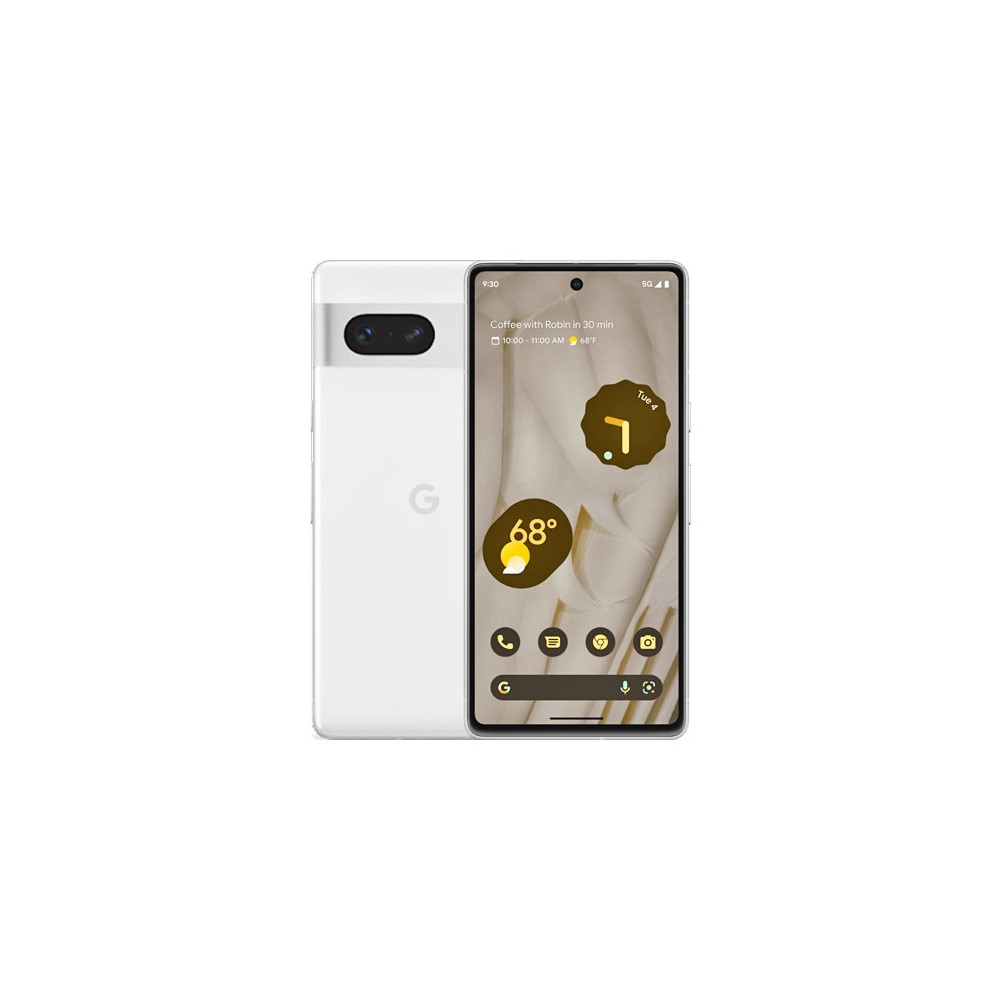
4%off
Google Pixel 7a
The best sub-$500 camera phone
Solid performance and plenty of RAM
Improved 90Hz display
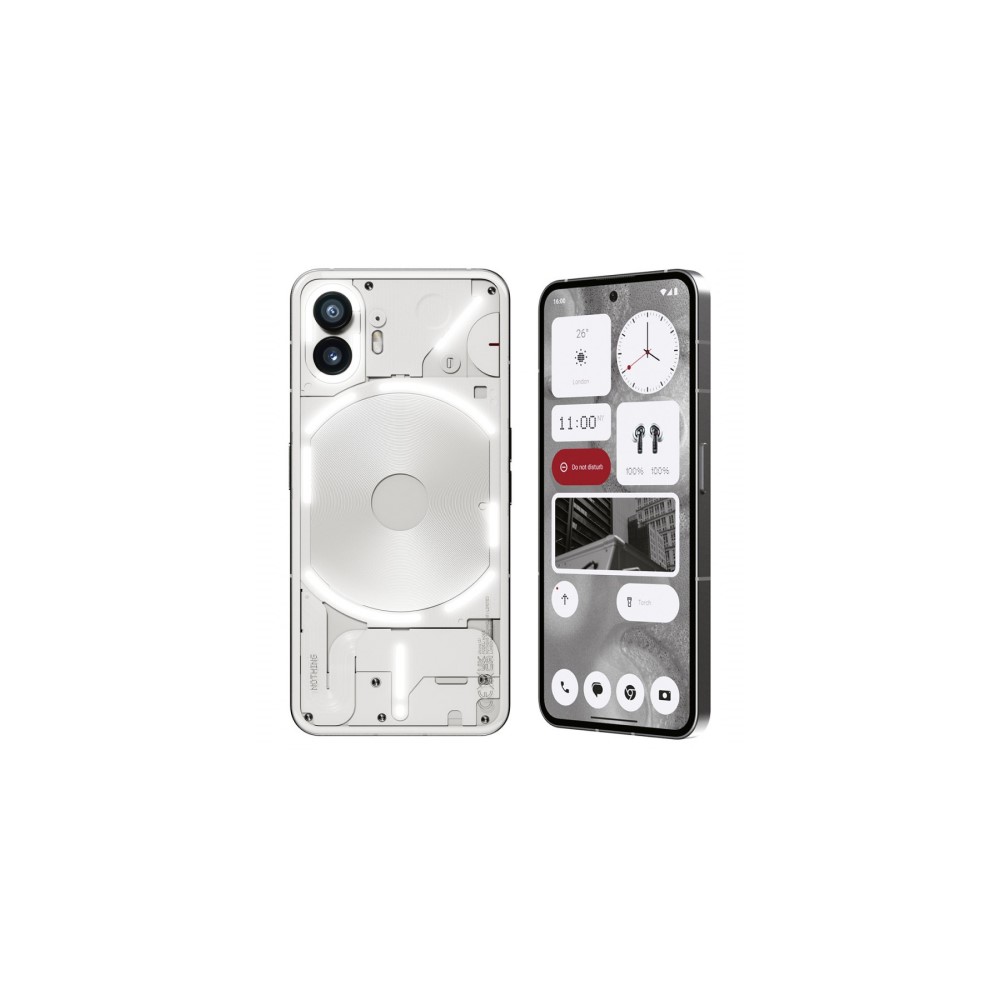
Nothing Phone 2
Expertly crafted, effortlessly cool design
Flagship-tier performance
Excellent value
Should you get the Pixel 7a or the Nothing Phone 2?
114 votes

